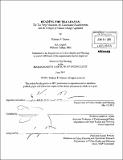Reading the tea leaves : the Tea Party movement, the conservative establishment and the collapse of climate change legislation
Author(s)
Dineen, Kathryn P. (Kathryn Patricia)
DownloadFull printable version (2.987Mb)
Alternative title
Tea Party movement, the conservative establishment and the collapse of climate change legislation
Other Contributors
Massachusetts Institute of Technology. Dept. of Urban Studies and Planning.
Advisor
Judith A. Layzer.
Terms of use
Metadata
Show full item recordAbstract
The Tea Party movement, which derives its name and revolutionary zeal from the 1773 Boston Tea Party anti-tax protest, emerged in response to the Obama Administration's economic stimulus package and later coalesced around opposition to universal health care, union collective bargaining rights, and raising the debt ceiling. In a less visible fashion, however, the movement has also set its sights on another target-environmental regulation. In fact, the Tea Party played an important but little-noticed role in preventing the passage of comprehensive energy and climate change legislation. Tea Party campaigns against the Senate's American Power Act 2010, or Kerry-Graham-Lieberman bill, pressured Lindsey Graham (R-SC) to withdraw support for the bill, demonized the cap-and- trade approach to regulating greenhouse gas emissions, and reinvigorated skepticism about climate-change science. A closer examination of these campaigns reveals that the Tea Party is motivated by an antiregulatory ethos, rooted in response to anti-New Deal liberalism and anti- Communism, that is not marginal or extreme, but consistent with that of the Republican Party. The uprising is, therefore, a manifestation of the conservative establishment's rightward shift-a move propelled by a network of entrenched free-market advocacy groups, think tanks, charitable foundations, industry interests, and mainstream conservative media. This dynamic conservative network-defined by the unique role of Koch Industries and the climate change "denial machine"-has largely enabled the Tea Party's success. The future of the Tea Party is uncertain and several factors suggest that the wave of populist fervor may have crested. However, even if protests subside, the Tea Party's antiregulatory ethos is likely to endure as part of the Republican Party's increasing conservatism.
Description
Thesis (M.C.P.)--Massachusetts Institute of Technology, Dept. of Urban Studies and Planning, 2011. Cataloged from PDF version of thesis. Includes bibliographical references (p. 42-53).
Date issued
2011Department
Massachusetts Institute of Technology. Department of Urban Studies and PlanningPublisher
Massachusetts Institute of Technology
Keywords
Urban Studies and Planning.